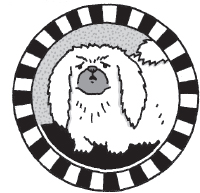
Years ago, on my sixteenth birthday, I was given five pounds to buy a Persian kitten. Most girls pine for an animal of their own but, even as a little child, for me the longing was not just for an animal but for an extraordinary animal; I would have loved a unicorn rather than a pony, if there had really been unicorns, or a salamander, or a kylin – that mythical monster with the head of a lion and the body of a dragon – if I had known about them, but a Persian kitten was the nearest my dear family could come to fulfilling this unusual wish.
In the pet shop there was a rusty old bird-cage and in it sat a puppy, small, square, black with cream paws and vest; he was of a kind I had not seen before, but his eyes, that took up most of his face, looked at me compellingly. I bought him, my five pounds was accepted as a down-payment with a pledge of half a crown a week from my allowance for a year.
I am sure now that the shopkeeper did not expect me to come back as, in pekingese parlance, this puppy was flawed; for one thing his lower jaw protruded, a fault the Chinese call ‘earth covers heaven’, so that he was worth precisely nothing – to anybody else; but I am glad now that I met every one of those Saturday morning extortions so that my lifetime of pekingese – I have had more than twenty – was founded on fidelity, however slight. I called the puppy Piers because it was the most aristocratic name I could think of.
In those days, though I had an ignoramus’s love of things Chinese, poetry, ceramics and paintings, I knew nothing of the dynasties and their emperors and empresses; of palace cities and paeony-terraced ten-mile-wide gardens; of eunuchs and concubines; of the silk caravan route or of opium clippers. I knew practically nothing either of Queen Victoria and Court life at Windsor, Balmoral and Buckingham Palace; of treaties and wars and, if I had, would not have dreamed of connecting them with pekingese. I only knew Piers but my instinct was right – no matter how flawed, Piers by origin was aristocratic – more, he was Imperial.
It may seem absurd to link a race of small dogs with two vast empires, one Western, the other Far Eastern and, in particular, with the two powerful women who, in the nineteenth century, ruled over them, but no one can follow the story of the pekingese without some knowledge of these two utterly different and distant worlds.
The Chinese regarded Westerners as vandals and there is certainly something unthinking and prejudiced in the image of this blithe and historic breed we have conjured up and, sadly, often made fact: that of rich ladies’ lapdogs, pampered and delicate, dressed in coats, bad-tempered, even snappy, wheezing, snoring and so adipose they can only waddle. If they have been distorted into this, the fault lies with the owner, not with the dog. True, elderly people buy them believing they need little exercise – which is wrong; most pekingese detest laps, are even wary of fondling, are only bad-tempered through being made liverish from too many tidbits. It is true, too, that they snore, but that is because of what man, through the ages, has done to their noses, and the snores are usually only a soporific snuffle. As for waddling! Pekingese can race, even hurdle; they retrieve, swim and are more hardy than many a big dog, walking in any weather; sometimes in snow or deluging rain my pekingese have been the only dogs out in the woods or on the hills.
Most of us dog-owners are ordinary people and so most pekingese nowadays have to settle not for palaces, but for an ordinary humdrum life, but they still treat it in a lordly way. Piers, for instance, soon became a well-known character in our Sussex town. ‘In quod again’, a policeman would come to our door and say, and I would have to go to the police station and redeem Piers with a fine of five shillings. The trouble was that while I was away at school he was bored and so would slip out; and kind people, seeing a small pekingese wandering alone, thought he was lost. By no means: a bus ran from a stop near our then house up to the Downs; one morning I caught it with Piers, meaning to take him for a walk on the rolling green hills – it should have been a chariot or imperial cart or, at least, a car, but for us it had to be a bus. ‘That your dog, Miss?’ asked the conductor. ‘Well, I guess you owe the Corporation at least five pounds.’ It seems that Piers caught the bus in the morning, took himself off to the front seat on the top – buses were open-topped then – alighted at the terminus at the foot of the Downs and went rabbitting and, at the right time, caught the bus home. I had long been puzzled by the earth on his paws and ruff.
He became my shadow, mourning if I went anywhere without him, making a carnival of joy of my return; alert to every word I said, sensitive to every mood, but after twenty halcyon months we went back to India and I had to leave him. I never saw him again.
Rumer Godden